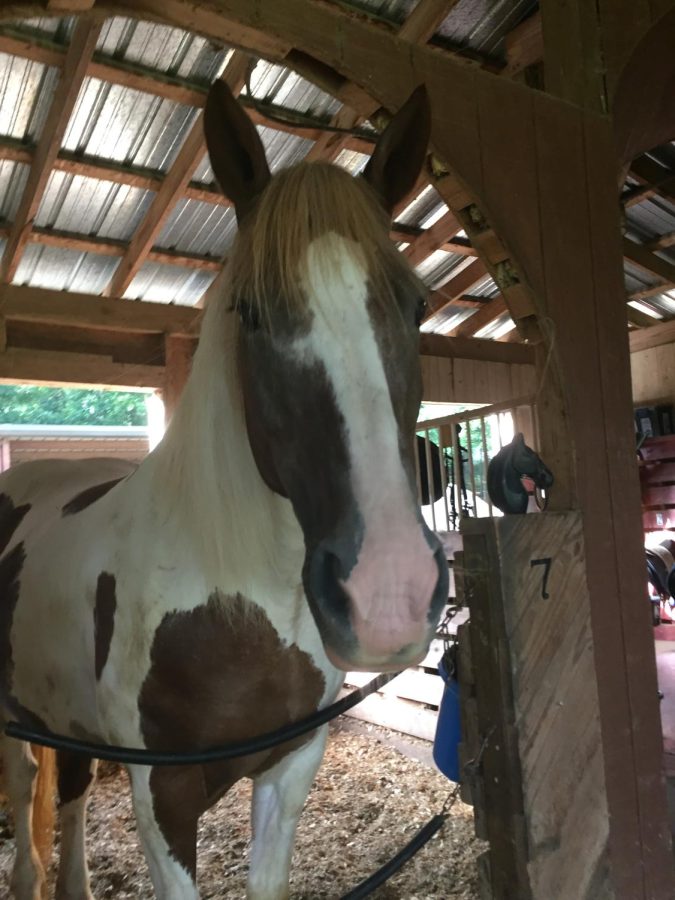Horses affects on humans mentally, emotionally
November 28, 2022
The development of humans and the bonds they have with horses throughout time emerged over a millennia ago. As time has progressed, horses have been used for working purposes, sports, and companionship.
“[Horses] help relieve a lot of stress. There’s some days I go to the barn, and I’m just so stressed out, and then if I’m not even riding and I’m just around the horses, all of that stress goes away,” junior Peyton Lockwood said.
Although the first known documented link between humans and horses comprised of a 30,000-year-old European cave painting of three horses, the estimated domestication of horses occurred around 4500 years ago, most likely in modern-day Kazakhstan and Ukraine.
Since then, horses have been used to pull chariots and wagons, plow fields, carry supplies for wars, and, most commonly now, for leisurely riding and competitive types of riding, such as showjumping, dressage, barrel racing, and eventing.
“Helping the people with farm work and stuff was definitely how [horse-riding] started. [People thousands of years ago] needed [horses] for war and farming,” senior Lindsay Walters said.
Aside from working, horses can form bonds with their riders and caretakers due to their ability to recognize human emotions. According to the University of Kentucky College of Agriculture, Food and Environment, “Horses can help young people calm their emotions with their comforting smell, their large presence and their warmth; they are often several degrees warmer than we are. Since they are prey animals, horses are more attuned to their environment and highly responsive to human emotions.”
As a result of these natural emotional detections, horses are able to serve as a form of therapy for not only frequent riders, but also special-needs individuals and people with mental illnesses.
“[Horse riding] can just really help somebody through stuff, like having to take care of [the horse] and having, you know, just the bond between the two of them,” sophomore Lucy Runnells said.
For people with mental illnesses, horses can help build self-esteem, perspective, willpower, trust, and empowerment. Particularly, due to human-horse interactions, veterans with PTSD can, according to Columbia University Department of Psychiatry, “relearn how to recognize their feelings, regulate emotions, and better communicate, as well as build trust and come to trust themselves again.” Similarly, people with anxiety experience a decreased amount of symptoms around horses.
“[Horses] are very down-to-earth; you can just be yourself around them, and you won’t get judged for it,” Lockwood said. “[Riding horses feels] very freeing, and [it makes me feel] just relaxed.”
In the same way horses can help people with mental illnesses, horses can be used as a form of therapy for people with Autism Spectrum Disorder (ASD), a developmental-based disability that varyingly affects an individual’s way of thinking, learning, and expressing from birth. With equine therapy, autistic people can build emotional bonds with their horses, while horses can help their rider’s engagement and language skills at the same time.
“It depends on the horse I think, but I think that if [the horse] is a well-trained, therapeutic horse then, from how calm it is and, you know, it can like, guide them,” Runnells said.
Locally, Union County is home to a variety of barns where new and existing riders can attend, lease, and board their horses. Some barns include Providence Equestrian Center, Cedarhill Farm, Thunderbay Riding Academy, Honeysuckle Riding Academy, and Cornerstone Farm.
“I ride up in upper Charlotte because that’s pretty close to my mom’s, but there’s a whole bunch of arenas since we’re close to the NC-SC line,” Runnells said.
With a selection of barns in Union County, there lies the possibility for more experienced riders and trainers to give advice to people new to horses and horse riding.
“[Horses] are therapeutic. They’re always there for you and [riding horses] gives you a life experience that you’ll never get anywhere else doing anything,” Walters said.


